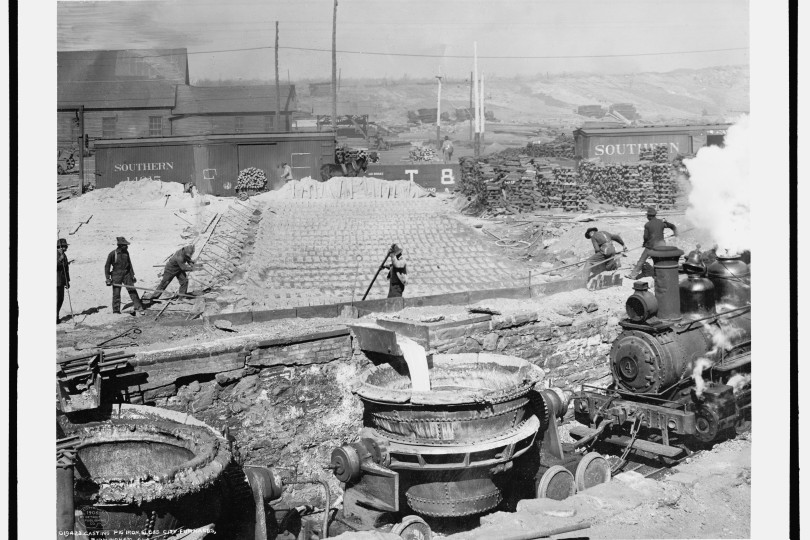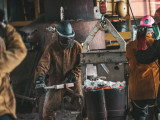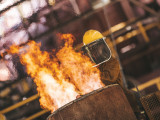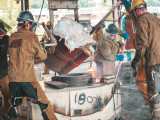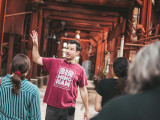“Historically, these workers would have benefited greatly from the Boilermakers union, and I am proud to have a hand on that torch.”
Slag run and filling slag pots at Sloss City furnaces, Birmingham, Alabama, circa 1906. Photo retrieved from Library of Congress
View Photo Gallery (5 photos)
Back in the day of its full-time operation, Sloss Furnaces in Birmingham, Alabama, was one of the largest iron producers in the South. Built in the late 1800s, it became a major player in the flourishing iron and steel industry. Today, Sloss Furnaces is a historical landmark, giving visitors a look into the living history of iron and steel. And the five employees of its artistic team at Sloss Metal Arts, a part of Sloss Furnaces, have joined the Boilermakers.
While it may be puzzling to have artists in the Boilermakers, it makes sense because of their craft.
“A lot of what they do is forging and blacksmithing,” said Great Lakes Organizing Coordinator Jody Mauller. “Their workplace is a national historic landmark. They take so much pride in what they do. It’s cool they chose us.”
Like many plants in its day, Sloss had a dubious history concerning segregation and anti-labor sentiment, which is one of the reasons Sloss Metal Arts Foundry Manager Odette Blaisdell wanted to join a union. As a resident artist at Sloss, they teach workshops on casting and welding, and they fabricate sculpture commissions.
“For me, this union symbolizes the final turn away from Sloss’s historic predatory and brutal treatment of workers and a new chance to treat workers fairly,” they said.
In addition, Blaisdell felt that there were specific aspects that were missing which could make them feel more secure and supported as an employee.
“It felt like our work environment was constantly shifting,” they said. “This prompted us to seek a union. Once we had voiced our intention, the symbolism of bringing in a union was both beneficial and metaphorical.”
Artist Sam Horowitz designs and fabricates unique cast iron artworks and awards from start to finish including wax sculpting, mold making, pouring iron and metal finishing. The team at Sloss Metal Arts also hosts public iron casting events, workshops and a summer youth apprenticeship program. Horowitz said the work is important so the metal arts don’t fade into obscurity.
“By teaching our skills to a wider audience, we can keep this craft alive and relevant for the next generation,” he said. “The skills students learn while working beside us are endlessly transferable. Too many young people are losing touch of working with their hands.”
As with other bargaining units that join the Boilermakers, Horowitz concurred with Blaisdell's sentiments about unionizing as a way to gain security at work.
“We felt it was important to unionize because management was changing the terms of our employment and taking away our stated benefits without reason or sufficient notice,” he said.
Unionizing at Sloss in 2023 wasn’t something past workers would have believed possible, because Sloss Furnaces' working conditions were frequently harsh. Long working hours, low pay and hazardous working conditions were imposed on workers, many of whom were immigrants and African Americans. They were often injured and ill from their work in the furnaces and blast furnaces, which were hot, noisy and frequently dangerous.
In the past, to improve their wages and working conditions, employees at Sloss began organizing. The Amalgamated Association of Iron, Steel, and Tin Workers orchestrated a lengthy strike at Sloss Furnaces in 1907. Yet the workers returned to their jobs with few concessions after the strike was finally ended by force. Eventually, Sloss Furnaces closed in 1970. And now they’ve turned that dark history around by voluntarily acknowledging the union.
Sloss is a truly unique historical national landmark—both in its location and its operations, according to Horowitz.
“We are granted paid time to work in our own studios, and this time supercharges me for the rest of the week,” he said. “From stoking our own fires, helping kindle young minds and losing ourselves in the occasional deep dive of a complicated commission, every day is different and interesting.”
As for Blaisdell, they enjoy any day they can pour iron. “Not only is it so exhilarating to feed the furnace, to open up the tap hole and to catch a ladle of molten iron—but iron pours are also when our team is most in sync with each other,” they said. “We all love pouring iron, so we are in our element, having fun, working together as one unit.”
As these new Boilermakers join Local 108 (Birmingham, Alabama), it’s Blaisdell’s hope that a new chapter has opened at Sloss. “With unionization, we hope to move away from the history of exploitation and instead carry on the site's legacy of ironmaking in a more just and fair workplace.”
For more information about Sloss Furnaces visit https://www.slossfurnaces.com
